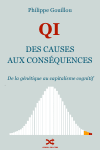Attention
However, evidence also suggested that between-class grouping (putting high-ability students in their own classes and low-ability students in their own classes) without changing the actual curriculum did not change academic achievement.
L'étude
Référence
Steenbergen-Hu, S., Makel, M. C., & Olszewski-Kubilius, P. (2016). What One Hundred Years of Research Says About the Effects of Ability Grouping and Acceleration on K-12 Students Academic Achievement: Findings of Two Second-Order Meta-Analyses. Review of Educational Research (Vol. 86). doi:10.3102/0034654316675417
Traduction de l'abstract
Deux méta-études de deuxième niveau ont synthétisé environ 200 années de recherches sur les effets du regroupement par capacité et de l'accélération sur la réussite économique d'écoliers. Les résultats de 13 méta-études sur le regroupement par capacité ont montré que les élèves ont bénéficié
Two second-order meta-analyses synthesized approximately 100 years of research on the effects of ability grouping and acceleration on K–12 students’ academic achievement. Outcomes of 13 ability grouping meta-analyses showed that students benefited from within-class grouping (0.19 ≤ g ≤ 0.30), cross-grade subject grouping (g = 0.26), and special grouping for the gifted (g = 0.37), but did not benefit from between-class grouping (0.04 ≤ g ≤0.06); the effects did not vary for high-, medium-, and low-ability students. Three acceleration meta-analyses showed that accelerated students significantly outperformed their nonaccelerated same-age peers (g = 0.70) but did not differ significantly from nonaccelerated older peers (g = 0.09). Three other meta-analyses that aggregated outcomes across specific forms of accelera- tion found that acceleration appeared to have a positive, moderate, and sta- tistically significant impact on students’ academic achievement (g = 0.42).
Version originale de l'abstract
Two second-order meta-analyses synthesized approximately 100 years of research on the effects of ability grouping and acceleration on K–12 students’ academic achievement. Outcomes of 13 ability grouping meta-analyses showed that students benefited from within-class grouping (0.19 ≤ g ≤ 0.30), cross-grade subject grouping (g = 0.26), and special grouping for the gifted (g = 0.37), but did not benefit from between-class grouping (0.04 ≤ g ≤0.06); the effects did not vary for high-, medium-, and low-ability students. Three acceleration meta-analyses showed that accelerated students significantly outperformed their nonaccelerated same-age peers (g = 0.70) but did not differ significantly from nonaccelerated older peers (g = 0.09). Three other meta-analyses that aggregated outcomes across specific forms of accelera- tion found that acceleration appeared to have a positive, moderate, and sta- tistically significant impact on students’ academic achievement (g = 0.42).
Liens
Communiqué de presse : New Analysis Finds Two Measures Boost K-12 Academic Achievement. Duke Today. December 6, 2016
Synthèse par les auteurs (3 pages - PDF) : Summary: What One Hundred Years of Research Says About the Effects of Ability Grouping and Acceleration on K--12 Student Academic Achievement
https://today.duke.edu/2016/12/new-analysis-finds-two-measures-boost-k-12-academic-achievement
PUBLISHED DECEMBER 6, 2016 IN ACADEMICS, RESEARCH NEW ANALYSIS FINDS TWO MEASURES BOOST K-12 ACADEMIC ACHIEVEMENT Grouping students by ability and providing opportunities for students to progress at a more rapid pace can increase overall achievement.
....
Steenbergen-Hu, S., Makel, M. C., & Olszewski-Kubilius, P. (2016). What One Hundred Years of Research Says About the Effects of Ability Grouping and Acceleration on K-12 Students Academic Achievement: Findings of Two Second-Order Meta-Analyses. Review of Educational Research (Vol. 86). http://doi.org/10.3102/0034654316675417`



















